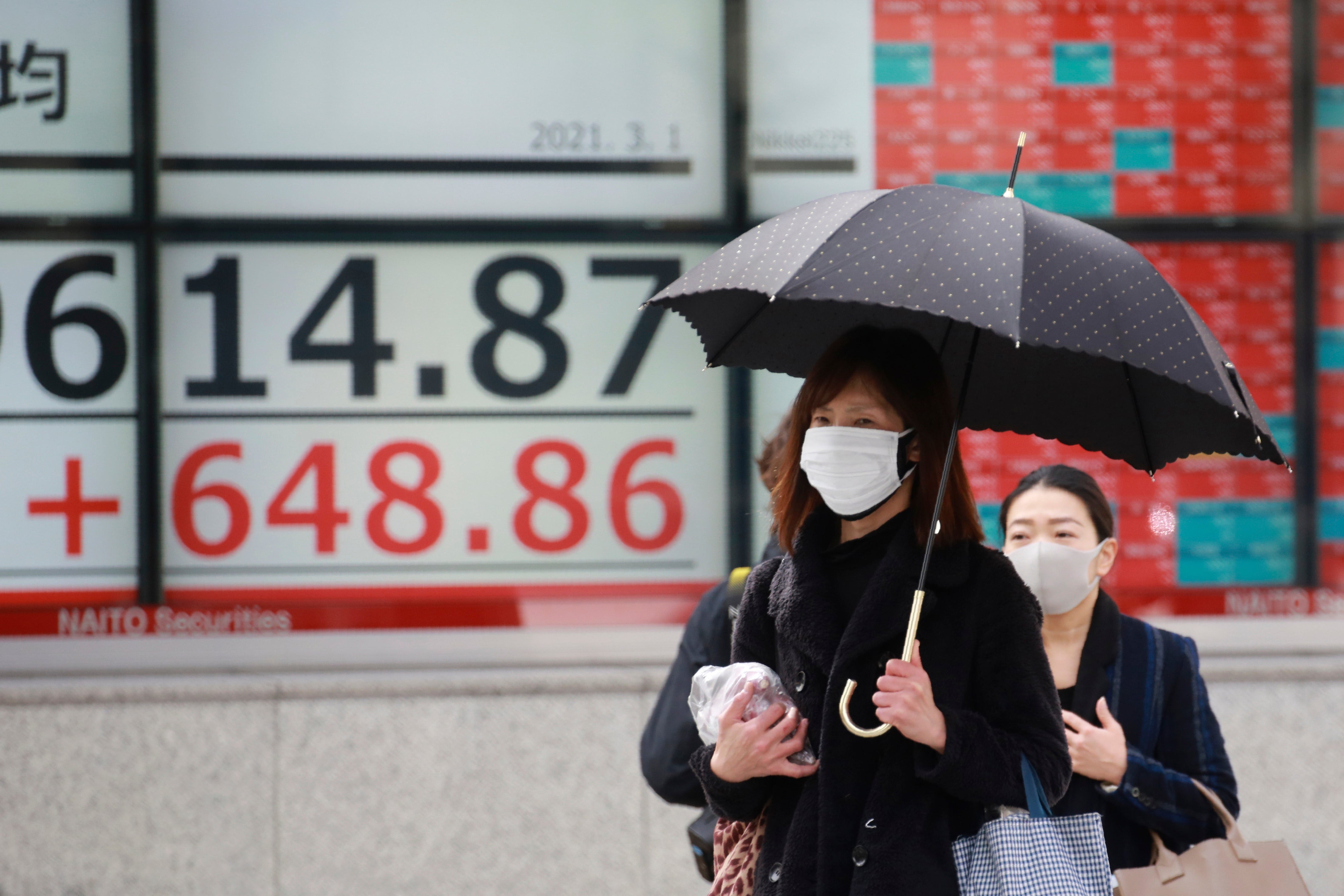Asian shares rise on hopes for US stimulus package
Asian shares have advanced on hopes for President Joe Biden’s stimulus package and bargain-hunting after sell offs last week

Your support helps us to tell the story
From reproductive rights to climate change to Big Tech, The Independent is on the ground when the story is developing. Whether it's investigating the financials of Elon Musk's pro-Trump PAC or producing our latest documentary, 'The A Word', which shines a light on the American women fighting for reproductive rights, we know how important it is to parse out the facts from the messaging.
At such a critical moment in US history, we need reporters on the ground. Your donation allows us to keep sending journalists to speak to both sides of the story.
The Independent is trusted by Americans across the entire political spectrum. And unlike many other quality news outlets, we choose not to lock Americans out of our reporting and analysis with paywalls. We believe quality journalism should be available to everyone, paid for by those who can afford it.
Your support makes all the difference.Asian shares rose Monday on hopes for President Joe Biden s stimulus package and bargain-hunting after sell offs last week.
Japan s benchmark Nikkei 225 surged 2.4% in afternoon trading to 29,663.50. Australia's S&P/ASX 200 jumped 1.7% to 6,789.60.
Hong Kong's Hang Seng advanced 1.3% to 29,348.99, while the Shanghai Composite rose 0.9% to 3,542.09, despite a survey showing slightly weaker manufacturing indicators for the month of February.
South Korean markets were closed for a national holiday. But the government reported that exports rose 9.5% in February from a year earlier and imports jumped nearly 14%, in signs the economy is picking up momentum.
A manufacturing survey for Japan showed an expansion in February for the first time since April 2019. The au Jibun purchasing managers index reading of 51.4 — on a scale of 1-100, where 50 and above show expansion — was a sharp improvement from the 49.8 level registered in January.
The survey showed improvements in many areas including higher sales and orders and higher exports, reflecting improved demand in overseas markets, especially China.
Asia's export-reliant economies are counting on a healthy American economy to boost trade, which has tended to stagnate during the pandemic. As the region's recovery begins to take off, vaccine rollouts are also gradually getting started in most Asian nations.
Worries about the economy, as well as about COVID-19, are still relatively widespread in Japan, which is seeing yet another wave of coronavirus cases. Some urban areas, like Osaka, have lifted measures to help prevent the spread of infections, but the Tokyo area remains under a “state of emergency,” focused on having restaurants, bars and other businesses close at 8 p.m. Japan has never had a lockdown.
The U.S. House of Representatives approved Biden’s $1.9 trillion pandemic relief bill on Friday and it now goes to the Senate for approval. The bill infuses cash across the struggling economy to individuals, businesses, schools, states and cities battered by COVID-19.
The U.S. stimulus bill would include yet another round of one-time payments to most Americans, including an expansion of other refundable tax credits like the child tax credit, and additional aid to state and local governments to combat the pandemic.
“It is still fundamentally good news that the sell-offs' economic underpinnings — increasing mobility, inflation, and US stimulus — are still intact, with global vaccinations rolling out faster than expected,” said Stephen Innes, chief global market strategist at Axi.
Wall Street ended last week mostly lower, pushing the S&P 500 to its second straight weekly loss. The S&P 500 index fell 0.5% to 3,811.15. Despite a two-week slide, the index managed a 2.6% gain for February after a 1.1% loss in January.
The Dow Jones Industrial Average dropped 1.5% to 30,932.37. The Nasdaq gained 0.6% to 13,192.34. The index still posted its biggest weekly loss since October. The Russell 2000 index of smaller companies eked out a small gain, adding less than 0.1%, to 2,201.05.
In energy trading, benchmark U.S. crude gained 98 cents to $62.48 a barrel in electronic trading on the New York Mercantile Exchange. It lost $2.03 on Friday to $61.50 per barrel. Brent crude, the international standard, rose $1.03 to $65.45 a barrel.
In currency trading, the U.S. dollar was unchanged at 106.56 Japanese yen. The euro cost $1.2086, up from $1.2074.
___
Yuri Kageyama is on Twitter https://twitter.com/yurikageyama